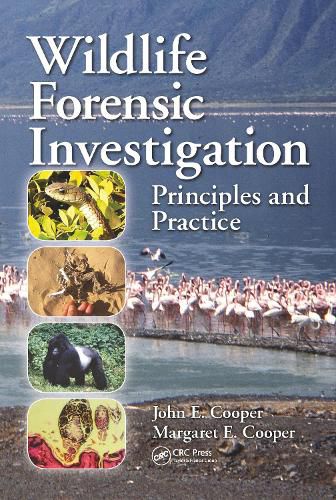Readings Newsletter
Become a Readings Member to make your shopping experience even easier.
Sign in or sign up for free!
You’re not far away from qualifying for FREE standard shipping within Australia
You’ve qualified for FREE standard shipping within Australia
The cart is loading…






Wildlife forensics is the application of forensic science to the conservation and protection of non-domesticated animals, both in the wild and in captivity. Providing an in-depth introduction to this rapidly evolving field, Wildlife Forensic Investigation: Principles and Practice also chronicles aspects of the history of management, conservation, and environmental protection, with an emphasis on their global importance in the twenty-first century.
The book examines the crucial role of wildlife forensic investigation with regard to live animals, dead animals and samples and covers national, regional, and international legislation. While the text particularly focuses on forensic science as it relates to wild animals, it also includes mention of plants and habitats because of their relevance to conservation. The book discusses animal welfare as well as the damage that can be inflicted on humans and property by wildlife.
Offering access to sound evidence based on good science and obtained using the best available practices, the book is enhanced by case studies from experts who describe some of their own work. This resource is essential for those involved in a range of endeavours, including investigating wildlife crime, identifying animal remains, ascertaining the circumstances of death of wild species, and other legal proceedings and activities concerning wildlife.
The forensic skills described in this book can be applied to a wide range of activities (not necessarily involving the legal process), including environmental impact assessments, insurance claims, governmental and other enquiries, checking of trading standards and the inspection of (for instance) pet-shops, animal boarding establishments, and zoological collections.
The authors point out that one of the most important requirements of those persons involved in wildlife forensic work is to retain an open mind. Such personnel should also be conscious of new developments and evolving techniques and be able to anticipate situations where their investigative and scientific skills might be used to advantage-so-called horizon scanning . Examples of these are given.
$9.00 standard shipping within Australia
FREE standard shipping within Australia for orders over $100.00
Express & International shipping calculated at checkout
Wildlife forensics is the application of forensic science to the conservation and protection of non-domesticated animals, both in the wild and in captivity. Providing an in-depth introduction to this rapidly evolving field, Wildlife Forensic Investigation: Principles and Practice also chronicles aspects of the history of management, conservation, and environmental protection, with an emphasis on their global importance in the twenty-first century.
The book examines the crucial role of wildlife forensic investigation with regard to live animals, dead animals and samples and covers national, regional, and international legislation. While the text particularly focuses on forensic science as it relates to wild animals, it also includes mention of plants and habitats because of their relevance to conservation. The book discusses animal welfare as well as the damage that can be inflicted on humans and property by wildlife.
Offering access to sound evidence based on good science and obtained using the best available practices, the book is enhanced by case studies from experts who describe some of their own work. This resource is essential for those involved in a range of endeavours, including investigating wildlife crime, identifying animal remains, ascertaining the circumstances of death of wild species, and other legal proceedings and activities concerning wildlife.
The forensic skills described in this book can be applied to a wide range of activities (not necessarily involving the legal process), including environmental impact assessments, insurance claims, governmental and other enquiries, checking of trading standards and the inspection of (for instance) pet-shops, animal boarding establishments, and zoological collections.
The authors point out that one of the most important requirements of those persons involved in wildlife forensic work is to retain an open mind. Such personnel should also be conscious of new developments and evolving techniques and be able to anticipate situations where their investigative and scientific skills might be used to advantage-so-called horizon scanning . Examples of these are given.